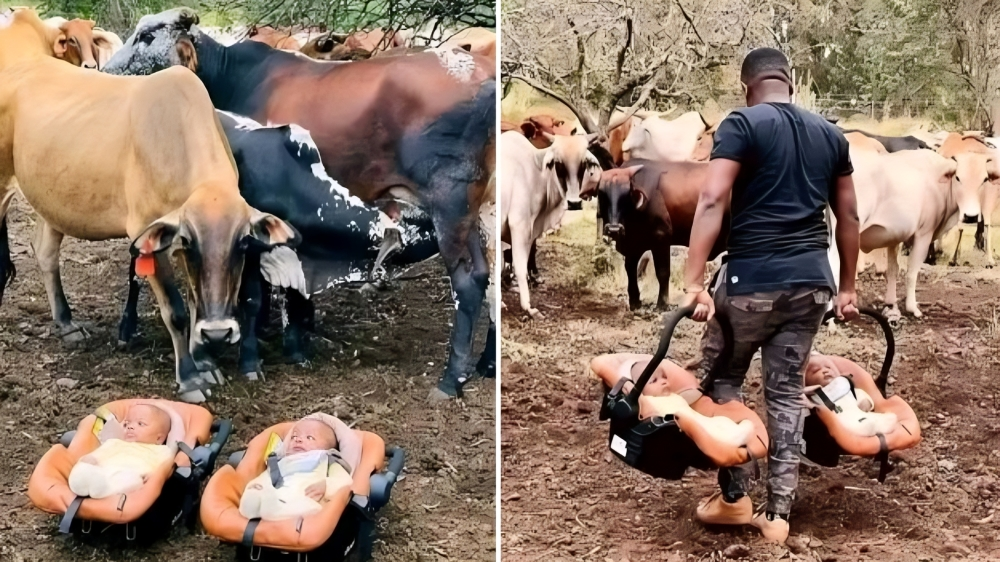
In today’s world, a DNA swab and lab analysis can settle paternity questions in a few days. But before modern science reached Africa’s villages, communities relied on older, more spiritual and traditional methods that were often brutal, bizarre, and rooted in ancestral belief.
From dipping infants into rivers to making cows judge the child’s legitimacy, these customs reflected an age-old obsession with lineage. The shocking truth is that some still practice these rituals even in this day and age.
Here are some of the strangest paternity rituals across Africa.
1. Oro Idile: (Nigeria)
In certain areas of southwestern Nigeria, the Yoruba tradition known as Oro Idile, which translates to “family lineage ritual,” was used as a form of paternity test long before any medical alternatives were available.
In this practice, elder matriarchs would prepare a bitter paste made from camwood, ewe akoko, and other sacred leaves, often mixed with palm oil or charcoal dust. This paste would then be applied to the newborn’s tongue or skin, and the baby’s reaction would determine the outcome of the ritual.
If the child remained calm, the elders declared the baby a rightful member of the father’s bloodline. However, if the baby coughed, vomited, or screamed uncontrollably, it was assumed that the baby might not be a true child of his father.
African DNA Test💔😪 pic.twitter.com/raXQgs3dAs
— Jaia (@Jaiathalien) October 26, 2025
This ritual, known as Oro Idile, was more than just superstition; it served as a public declaration of belonging. In Yoruba cosmology, it was believed that the truth could be revealed through the body’s natural responses, as the herbs would reject any false lineage.
Today, many Yoruba scholars condemn the practice as dangerous. The herbal mixture can contain irritants and bacteria harmful to newborns, especially where hygiene is poor. Yet, in some remote areas, Oro Idile still survives in symbolic form.
2. The Cow-Sniffing Test: (South Africa, Lesotho, Zimbabwe)
In some Zulu, Sotho, and Ndebele families, a newborn’s first encounter may be with cows instead of other family members. This ritual is simple but filled with spiritual significance. The baby is placed on the ground as the family’s cows approach, and their behaviour serves as an important test.
South African traditional DNA test.
This is a common practice by the Zulu people of South Africa. Also practiced in Zimbabwe and Lesotho.
The cows approach cautiously and harmlessly to inspect and sniff the baby. If the baby remains calm through the process, it belongs to the… pic.twitter.com/0wcV4ZqEmD— African Hub (@AfricanHub_) March 19, 2025
If the cows gently sniff or lick the baby, or if they stand calmly nearby, it indicates that the ancestors recognise the child and affirm that the child is truly of the man’s bloodline. However, if the cows turn away, snort, or if the baby cries violently, it raises concerns about the child’s legitimacy.
For the Zulu, cattle are more than livestock. They are the living connection to ancestors, each cow representing wealth, fertility, and spiritual guardianship. Though rarely performed today, Zulu elders still speak of it with nostalgic pride, saying, “The cow knows its blood.
3. The Cow-Licking Rite: (Uganda, Tanzania)
In certain regions of Uganda and northern Tanzania, both the Ankole and Maasai communities share a fascinating tradition. When a newborn arrives, a prized family cow, typically one owned by the father, is brought close to the baby. The child is either placed on the cow’s back or held near its face.
This is an African DNA test.. if the cow licks the baby it's yours 😂🙌🏾 pic.twitter.com/XmuCcbCFMs
— Carol Primah (@IamCarolPrimah) September 17, 2023
If the cow licks the child, it is considered a blessing, signifying ancestral acceptance and confirming the baby’s legitimacy as the man’s child. Conversely, if the cow refuses to lick or moves away, it can lead to suspicions of infidelity.
Among pastoral peoples like the Ankole, cows are divine. They are given names, mourned when they die, and invoked in marriage rites. Their saliva is considered pure and healing. Thus, a cow’s lick is considered the spirit world’s confirmation.
4. The Snake Test: (Nigeria)
In certain Yoruba traditions, stories are told of a chilling yet fascinating paternity ritual involving a snake. When a child’s legitimacy was questioned — or just to be sure —the baby would be placed beside a live snake, often a python considered sacred and a messenger of the gods.
The belief was simple yet terrifying: if the snake attacked or swallowed the child, it was a sign the child was a bastard, fathered by another man. But if the snake slithered away peacefully, the child was considered pure and accepted into the father’s lineage.
While there are no recent records of this being practised today, elders still recount it as a symbolic representation of truth and a way of letting the gods judge in secret matters that humans could not resolve.
In Yoruba spirituality, the snake represents wisdom, purity, and the unseen eye of justice. Even though modern science has long replaced such rituals, the story survives as a reminder of how deeply spiritual the Yoruba approach to truth once was.
5. The River Float Test: (Nigeria)
Among the Ijaw people of Nigeria’s Niger Delta, water is more than just a natural resource; it is sacred. The Ijaw believe that their ancestors reside in the rivers and creeks that surround them. These waters are often called upon to reveal truths, cleanse impurities, or confirm ancestral connections.
Seen the Ijaw DNA Test Video?? pic.twitter.com/hxU9hxS6cA
— Gr8 Khaleel⚡ (@gr8khaleel) May 11, 2025
In the olden days, when the legitimacy of a newborn was in question, elders would bring the baby and the mother to the riverbank for a spiritual ceremony. The ritual involved gently dipping the baby into the river while invoking ancestral spirits, asking them to accept the child into the lineage.
If the baby remained calm and floated on water, it was taken as a sign that the child was pure, accepted, and truly part of the family. If the baby screamed uncontrollably or drowned, then the baby is not one of them.








